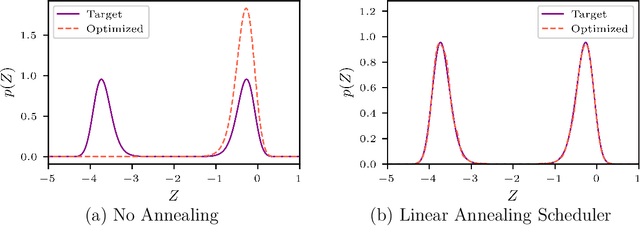Emma R. Cobian
LINFA: a Python library for variational inference with normalizing flow and annealing
Jul 14, 2023Abstract:Variational inference is an increasingly popular method in statistics and machine learning for approximating probability distributions. We developed LINFA (Library for Inference with Normalizing Flow and Annealing), a Python library for variational inference to accommodate computationally expensive models and difficult-to-sample distributions with dependent parameters. We discuss the theoretical background, capabilities, and performance of LINFA in various benchmarks. LINFA is publicly available on GitHub at https://github.com/desResLab/LINFA.
AdaAnn: Adaptive Annealing Scheduler for Probability Density Approximation
Feb 01, 2022



Abstract:Approximating probability distributions can be a challenging task, particularly when they are supported over regions of high geometrical complexity or exhibit multiple modes. Annealing can be used to facilitate this task which is often combined with constant a priori selected increments in inverse temperature. However, using constant increments limit the computational efficiency due to the inability to adapt to situations where smooth changes in the annealed density could be handled equally well with larger increments. We introduce AdaAnn, an adaptive annealing scheduler that automatically adjusts the temperature increments based on the expected change in the Kullback-Leibler divergence between two distributions with a sufficiently close annealing temperature. AdaAnn is easy to implement and can be integrated into existing sampling approaches such as normalizing flows for variational inference and Markov chain Monte Carlo. We demonstrate the computational efficiency of the AdaAnn scheduler for variational inference with normalizing flows on a number of examples, including density approximation and parameter estimation for dynamical systems.
 Add to Chrome
Add to Chrome Add to Firefox
Add to Firefox Add to Edge
Add to Edge